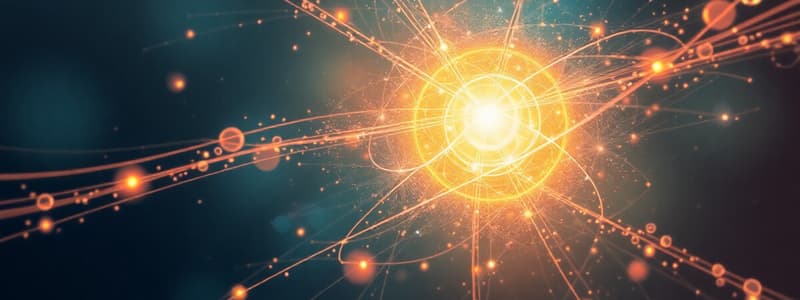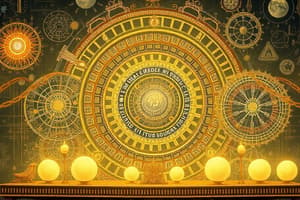Podcast
Questions and Answers
What does classical mechanics primarily focus on?
What does classical mechanics primarily focus on?
- The properties of atomic and subatomic particles
- The motion of objects and the forces acting on them (correct)
- The effects of gravity on objects at high speeds
- The behavior of light and its interactions
Which of the following best describes thermodynamics?
Which of the following best describes thermodynamics?
- The analysis of motion of celestial bodies
- The examination of light behavior and optics
- The study of electric charges and magnetic fields
- The investigation of heat, work, and temperature (correct)
What key principle is associated with electromagnetism?
What key principle is associated with electromagnetism?
- Time dilation
- Coulomb’s law (correct)
- Conservation of energy
- Wave functions
Which equation represents Newton's Second Law?
Which equation represents Newton's Second Law?
Which branch of physics describes the statistical nature of systems?
Which branch of physics describes the statistical nature of systems?
What is the primary focus of quantum mechanics?
What is the primary focus of quantum mechanics?
Which concept involves push or pull that changes an object's motion?
Which concept involves push or pull that changes an object's motion?
Which of the following applications of physics pertains to imaging technologies?
Which of the following applications of physics pertains to imaging technologies?
Flashcards are hidden until you start studying
Study Notes
Overview of Physics
- Physics is the natural science that studies matter, energy, and the fundamental forces of nature.
- It seeks to understand how the universe behaves through empirical laws and mathematical formulations.
Key Branches of Physics
-
Classical Mechanics
- Studies motion of objects and the forces acting on them.
- Key concepts: Newton’s Laws of Motion, energy, momentum.
-
Thermodynamics
- Focuses on heat, work, temperature, and the statistical nature of systems.
- Laws of Thermodynamics: conservation of energy, entropy.
-
Electromagnetism
- Examines electric charges, electric fields, magnetic fields, and their interactions.
- Key principles: Coulomb’s law, Faraday's law, Maxwell's equations.
-
Optics
- Studies the behavior of light and its interactions with matter.
- Key concepts: reflection, refraction, lenses, wave-particle duality.
-
Quantum Mechanics
- Describes the behavior of matter and energy at atomic and subatomic scales.
- Concepts: wave functions, uncertainty principle, quantum states.
-
Relativity
- Developed by Albert Einstein, focusing on the effects of gravity and the behavior of objects at high speeds.
- Special Relativity: time dilation, length contraction.
- General Relativity: curvature of spacetime, gravitational effects.
Fundamental Concepts
- Force: A push or pull that can change an object's motion.
- Energy: The capacity to do work; can take many forms (kinetic, potential, thermal).
- Mass: A measure of the amount of matter in an object; relates to gravitational attraction.
- Momentum: The product of an object's mass and velocity; conserved in isolated systems.
Important Equations
- Newton’s Second Law: F = ma (Force = mass × acceleration)
- Energy: Kinetic Energy (KE) = 0.5 × mv²; Potential Energy (PE) = mgh
- Ohm’s Law: V = IR (Voltage = Current × Resistance)
- Einstein’s Mass-Energy Equivalence: E = mc²
Applications of Physics
- Engineering: Design and construction of machinery, structures, and technology.
- Medicine: Imaging technologies (like MRI, X-rays), radiation therapy.
- Environmental Science: Understanding climate change, energy resources.
- Astronomy: Physics of celestial bodies, understanding the universe.
Experimental Physics
- Involves observing physical phenomena, conducting experiments, and developing theories based on data.
- Techniques include:
- Controlled experiments
- Observational studies
- Computational simulations
Key Figures in Physics
- Isaac Newton: Classical mechanics, laws of motion.
- Albert Einstein: Theory of relativity, quantum effects.
- Niels Bohr: Atomic structure and quantum theory.
- Marie Curie: Pioneering research on radioactivity.
Overview of Physics
- Physics studies matter, energy, and fundamental forces of nature.
- It aims to understand the universe's behavior using empirical laws and mathematical formulas.
Key Branches of Physics
- Classical Mechanics studies the motion of objects and forces acting on them.
- Key concepts include Newton's Laws of Motion, energy, and momentum.
- Thermodynamics focuses on heat, work, temperature, and the statistical nature of systems.
- It includes the Laws of Thermodynamics, which cover energy conservation and entropy.
- Electromagnetism examines electric charges, electric fields, magnetic fields, and their interactions.
- Key principles include Coulomb's law, Faraday's law, and Maxwell's equations.
- Optics studies light behavior and its interactions with matter.
- Key concepts include reflection, refraction, lenses, and wave-particle duality.
- Quantum Mechanics describes the behavior of matter and energy at atomic and subatomic scales.
- It includes concepts like wave functions, the uncertainty principle, and quantum states.
- Relativity, developed by Albert Einstein, focuses on the effects of gravity and high-speed object behavior.
- Special Relativity covers time dilation and length contraction.
- General Relativity explores spacetime curvature and gravitational effects.
Fundamental Concepts
- Force is a push or pull that can change an object's motion.
- Energy is the capacity to do work and can exist in various forms, such as kinetic, potential, and thermal.
- Mass measures the amount of matter in an object and is related to gravitational attraction.
- Momentum is the product of an object's mass and velocity, conserved in isolated systems.
Important Equations
- Newton's Second Law: F = ma (Force = mass × acceleration).
- Energy: Kinetic Energy (KE) = 0.5 × mv²; Potential Energy (PE) = mgh.
- Ohm's Law: V = IR (Voltage = Current × Resistance).
- Einstein's Mass-Energy Equivalence: E = mc².
Applications of Physics
- Engineering: Design and construction of machines, structures, and technologies.
- Medicine: Imaging technologies (MRI, X-rays), radiation therapy.
- Environmental Science: Understanding climate change and energy resources.
- Astronomy: Physics of celestial bodies, understanding the universe.
Experimental Physics
- Involves observation of physical phenomena, experiments, and theory development based on data.
- Techniques include:
- Controlled experiments
- Observational studies
- Computational simulations
Key Figures in Physics
- Isaac Newton: Developed classical mechanics and the laws of motion.
- Albert Einstein: Developed the theory of relativity and investigated quantum effects.
- Niels Bohr: Contributed significantly to atomic structure and quantum theory.
- Marie Curie: Pioneered research on radioactivity.
Studying That Suits You
Use AI to generate personalized quizzes and flashcards to suit your learning preferences.




